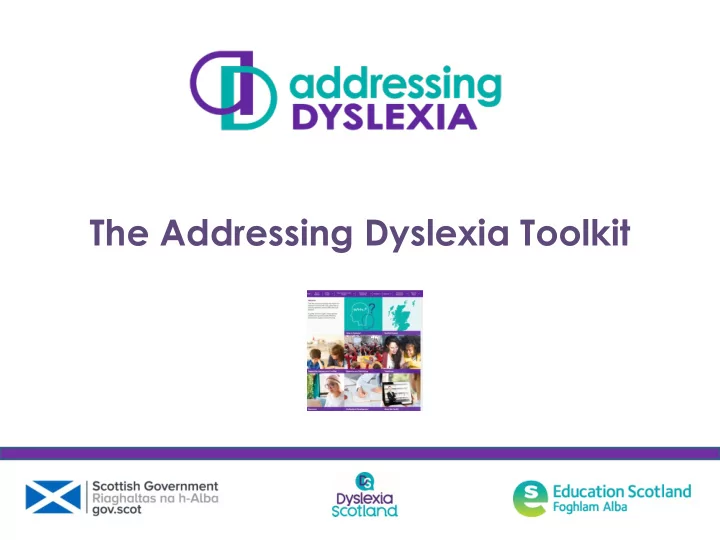

The Addressing Dyslexia Toolkit
National Dyslexia Reviews in Scotland Education Scotland HMI October 2008 May 2014 Summer 2014 March 2017
The Making Sense Working Group are working with stakeholders to support the implementation of the 5 inter-connecting recommendations which involves supporting schools and local authorities: • Improve the outcome for learners with Dyslexia and • Further develop their inclusive practice • Increase the use of the Toolkit by teachers and authority staff “greater use of the Toolkit would help staff to meet more effectively the needs of children and young people with dyslexia ”. Making Sense Review 2014
Refreshed 2017 Toolkit The refreshed Toolkit was launched on the 8 th March 2017 by The Deputy First Minister and Cabinet Secretary for Education and Skills John Swinney and Sir Jackie Stewart , President of Dyslexia Scotland. Refresh Aims: • Support the 2014 Making Sense Report recommendations • Ease the experience of site navigation • Provide schools and local authorities with : o Information within the Scottish educational context, o Opportunities for professional learning, o Examples of good practice o Access to free resources • Further develop the Pathway for the Identification of Dyslexia and Literacy Difficulties for 3 – 18 years (school)
About the Toolkit This website is for all who work with pre-school and school-age children and young people in a professional educational setting, and seeks to reassure that dyslexia is not a mystical or mythical problem that only specialist highly trained individuals can deal with. Everyone has the skills and abilities to recognise early signs of dyslexia in children at all stages, and take appropriate action in response to support children and young people.
What is dyslexia? Task What does dyslexia mean to you? What strengths are associated with dyslexia? What difficulties are associated with dyslexia? At all stages, dyslexia is on a continuum varying from mild to severe, with a range of strengths and difficulties and, according to the nature of the activity undertaken, the learning environment and any coping strategies and support in place. As a result, every individual with dyslexia will differ in the range of factors that are affected and in the level of severity experienced. There is however a common set of signs that can be observed.
The Scottish Definition of Dyslexia
Scottish Context Scotland’s education system is an inclusive one and is designed to make sure that every child and young person is entitled to support to enable them to gain as much as possible from the opportunities which Curriculum for Excellence can provide.
Supporting Learners and Families Assessing dyslexia and providing appropriate support are processes which rely on each other. They are symbiotic. The following headings support the identification process, providing support and then establishing if the difficulties are likely to be due to dyslexia. • Starting the Process • What to look for • Other Factors to Consider
Supporting Learners and Families Effective communication is essential in supporting appropriate identification, planning and monitoring of dyslexia. This section also provides information on • Support strategies • Technology to support literacy and numeracy • FAQs
Assessing and Monitoring This section provides information and resources on • Understanding what is meant by assessment • The identification pathway for dyslexia and literacy difficulties • Roles and responsibilities • Establishing and recording needs forms • Reporting
Transitions The process of transition can be eased with appropriate understanding, partnership work, support and planning. This section provides information and advice to support transitions at all stages .some examples are below: • Class to class • Year to year • Nursery to P1 • P7 – S1 • S1 – S2 • Off- site • Post school
Resources In this section there are a range of free resources available on the areas highlighted below to support educational practitioners and learners. Literacy Circles Q & As Forms and templates Literacy Technology section Memory Assessments Numeracy and math Auditory processing and listening skills Visual processing Comprehension Co ordination
Professional Development The Toolkit is a resource to support professional learning and development. This section has a range of free professional learning resources to support schools and local authorities.
Free Professional Learning Resources CLPL Routemap for Dyslexia and Inclusive Practice Free online modules - developed in partnership with the Open University- OEPs programme, Education Scotland, Dyslexia Scotland and The Scottish Government.
Pause for Thought… We ought to begin to pay less attention to getting everyone over the same hill using the same path. We may wish to encourage some to take different routes to the same end. Then we might see good reasons for paying careful attention to their descriptions of what they have found. We may wish to follow them some day. Tom West 1991 ‘In The Minds Eye’
To get in touch with the Toolkit team or to send suggestions, case studies and materials, please email toolkit@dyslexiascotland.org.uk
Recommend
More recommend